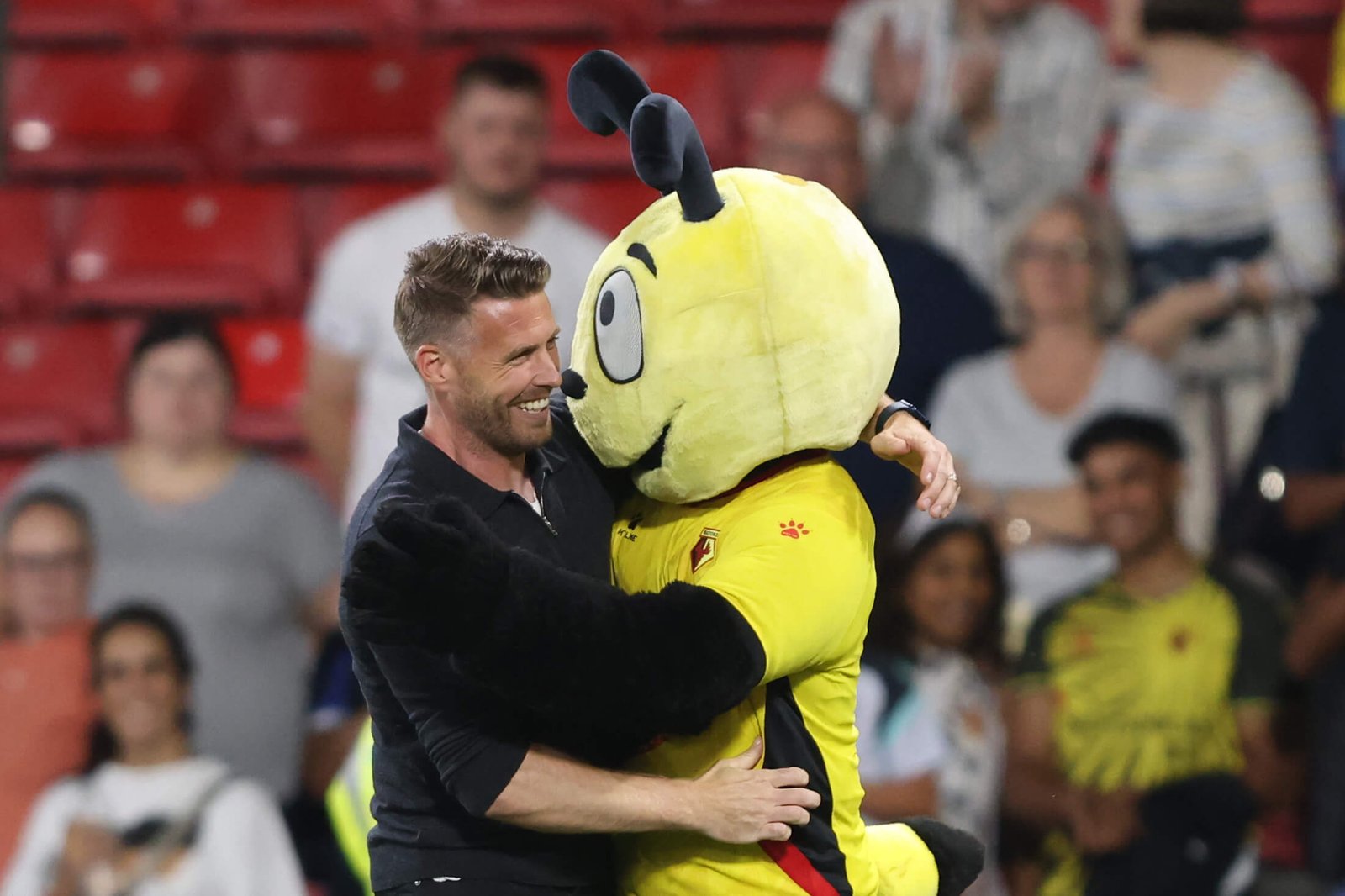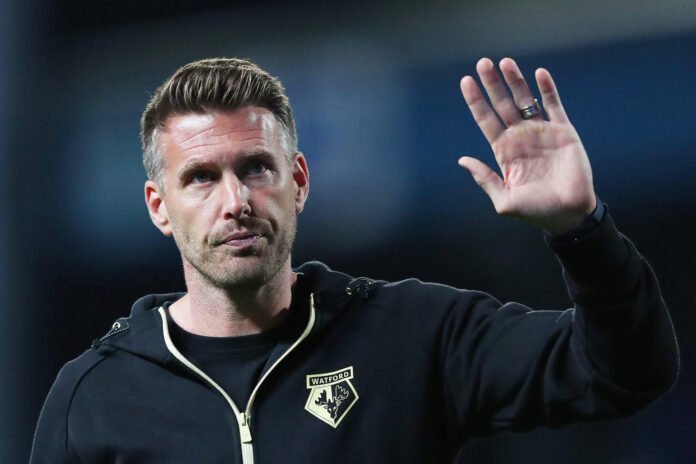Under Rob Edwards’s first interview as Watford’s manager on The Athletic in June 2022, one comment stood out. It came from subscriber Robert F, who said, “Seems like a nice bloke. Will be a shame to see him gone by September.”
The prophecy was spot on. Not only is Edwards a nice bloke, but he was also sacked on September 26, after just 11 games in charge.
Robert would not have been able to predict the next bit: Edwards taking over Watford’s great rivals Luton Town, guiding them to the Premier League through the play-offs and pushing them towards safety in the top flight.
The 41-year-old has gone on to bigger and better things after his 139-day spell at Vicarage Road. He has proven to be a smart and sensitive coach capable of galvanising a team amid adversity.
Luton are now outside the relegation zone after a run — 11 points from six matches — that puts them fourth in the Premier League form table behind Manchester City (15 from five), Liverpool and Wolves (13 from six).
According to Opta, Luton’s outstanding 4-0 win over Brighton on January 30 cut their relegation likelihood from 62 to 36.3 per cent, which reduced further to 32.6 after the 4-4 thriller at Newcastle.
They’re still seen as one of the three most likely to go down. But Luton will be troubling the likes of Nottingham Forest and Everton, both of whom face a profit and sustainability regulations (PSR) charge.
But while Edwards is now growing into the challenges of the Premier League, his Watford tenure was like an ice bath. He was appointed when they were plummeting out of the top division under the stewardship of Roy Hodgson. Luton, by contrast, are now just three points shy of Watford’s 2021-22 season total of 23 points and are only two goals off Watford’s tally for that campaign (32).
Securing the services of Edwards was an attempt to sweeten the tail of an awful season. Edwards was introduced to the Watford crowd on May 15 2022, before the last home Premier League game: a 5-1 defeat against Leicester City.
Edwards being unveiled (Luke Walker/Getty Images)
Watford plucked Edwards from League Two champions Forest Green Rovers but didn’t let him ripen. That’s despite chairman/CEO Scott Duxbury’s pledge to back him “come hell or high water.”
Despite the preceding season — complete with three head coaches: Xisco Munoz, Claudio Ranieri and Hodgson — there was optimism. They’d not gone for a young, up-and-coming British manager before. Perhaps the penny had dropped.
Before a summer concert at Vicarage Road, the former chairman and lifelong fan Sir Elton John spoke at length to Edwards about his plans. John had forged a strong bond with Graham Taylor in the late 1970s and 80s when the club rose up the divisions. As a player, Edwards was given his first-team debut by Taylor at Aston Villa in 2002.
John told the crowd he looked forward to a team playing “with a lot more f***ing passion.” Edwards was dialled into the mood too. During a live Sky Sports News interview, he helped recreate the domino-effect scene from the “I’m Still Standing” music video.
Unfortunately, it proved a metaphor for Edwards’s short tenure, which collapsed quickly. Not that it was Edwards’ fault. He soon found out he was at a club that was unsteady at best.
Relegation signalled a mass exodus of players. The remaining stardust in the squad almost left too, with Newcastle’s approach for Joao Pedro and Aston Villa’s for Ismaila Sarr falling down late on.
Edwards wanted homegrown rather than far-flung players to shape a new team. Aston Villa striker Cameron Archer was high on his list, as was Manchester United’s pacy wing-back Ethan Laird. But both deals collapsed in the negotiations. The wing-back provided instead was Villarreal’s Mario Gaspar, who was the polar opposite of Edwards’ desired overlapping operator for his 3-5-2 system. It was a square peg in a round hole.
Keinan Davis eventually came in on loan from Aston Villa but the other strikers cooked up for selection were Rey Manaj (Barcelona B) and Vakoun Bayo (Charleroi). Neither looked capable of leading a promotion-challenging side.
Edwards got two other domestic loan signings over the line: Hamza Choudhury and Kortney Hause. Only the former made an impact.
With all the comings and goings, Edwards, along with assistant Richie Kyle, did well to lay solid early foundations. Both Sheffield United and Burnley, who went on to get promoted, were defeated 1-0 at home in an opening spell of five unbeaten matches that included three draws.

(Marc Atkins/Getty Images)
The next five included a first defeat of the season at home to QPR, in which Laird (who’d gone there instead) played an important role for the visitors. After responding with a victory against Middlesbrough, it was then three without a win, including a 2-0 loss at Blackburn Rovers.
Watford were 10th, one point outside the play-off places. Their owner Gino Pozzo decided to call time on Edwards’ time at Vicarage Road.
This was a ruthless act with little foundation.
Edwards took training for the first week of the international break and oversaw a behind-closed-doors game against Fulham. Whispers started at the training ground that his days were numbered.
Tensions had been bubbling between Edwards and sporting director Cristiano Giaretta over scheduling and training. In the build-up to the break, striker Davis said, in an interview with the Watford Observer: “We don’t want a change of coach — definitely not. The gaffer (Edwards) needed to be given full control. He needed to be able to move things around. Now he’s got the opportunity to show he can take us up.”
But Pozzo decided to side with his fellow countryman. While Edwards was still in situ, they laid the groundwork for the appointment of Slaven Bilic, which was announced 15 minutes after Edwards’s sacking.
“I believe this change to be in the best interests of the club,” said Pozzo. “We felt Rob had enough time to show us the identity of his team, however, performances haven’t reflected our hopes and ambitions.”
Pozzo’s logic was misguided. By the end of the season, he’d gone through two more head coaches (Chris Wilder followed Bilic) and appointed Valerien Ismael, the 19th permanent head coach or manager since the Italian takeover in 2012.
Given a chance to own up that it had been a mistake to sack Edwards at a summer fan forum, he said: “Like any coach or player, there is a fit: you either get a good fit or you don’t. We didn’t see things developing in the right way. We saw the work, the approach, and it wasn’t working for us.”
Pozzo and patience historically don’t go hand in hand.
“I cannot sit back and wait for something to happen (if I don’t think things are going in the right direction). I prefer to expose myself and make a change and then admit that a mistake has been made. Sometimes you’re going to make mistakes. It’s how you face the problem in front of you.”
What transpired after Edwards’s departure did make Pozzo look silly — however much he puts a brave face on it. Bilic and Wilder’s combined efforts left Watford 11th, one place lower than when Edwards left and six points, rather than one, behind the top six.
To rub salt into the wounds, Edwards’s Luton beat Watford 2-0 at Kenilworth Road during a 14-game unbeaten end to the regular season. It may have made Pozzo feel better if Edwards had been more combative towards his former team, but instead, he rose above it — in every sense — and refused to get embroiled in any criticism.
To be promoted with the man who’d been prematurely relieved of his duties at your great rivals was perfect for Luton fans. He’d not been in Hertfordshire long enough for it to be a worry that he’d come from “them lot down the road”.
They’d been to hell and back, dropping to non-League before working their way back up, while Watford played six of seven seasons in the Premier League from 2015-16. Watford were considered the well-heeled part of the rivalry, with Luton more rough and ready. Truth be told, the two towns are much of a muchness. Only one has an international airport, though.

(Daniel Leal/AFP via Getty Images)
Pozzo’s impression of Edwards not being the right fit may have some substance though. Dealing with the politics of the Watford job isn’t for everyone. Having the club hierarchy breathing down your neck at the training ground can be overbearing. Edwards, let’s not forget, was still finding his feet in management and the multicultural, Udinese-partnered setup was a big and different world from Forest Green.
The landscape at Luton, albeit a more established club with a richer history than Forest Green, was more akin to a lower-league environment. The ethos and values built up in adversity were perhaps more nurturing, rather than having to deal with a post-Premier League redesign with big earners on the books.
Edwards’s diplomacy throughout his four-month stint at Watford was impressive. He was aware that it may not last long. History told him that. But he kept his dignity throughout.
However much Watford fans dislike — or, let’s be honest, hate — seeing Luton do well in the Premier League, there’s an admiration for the job Edwards has done. Which often leads to a question: ‘What if?’
As Robert F. predicted the future after his appointment, under the article which analysed Edwards’ departure on The Athletic, Antony W recited the story of a scorpion enlisting the help of a frog to cross a river. The frog, despite having some concern about being stung, agrees. Yet the scorpion stings the frog anyway, dooming them both. The comment concluded: “The dying frog asks the scorpion why it stung despite knowing the consequence, to which the scorpion replies: ‘I am sorry, but I couldn’t resist the urge. It’s in my nature.’”
But perhaps Pozzo has changed. This season, when three consecutive defeats left Watford just outside the relegation zone after 10 games, he went against the grain and stuck with Ismael. Since then, they’ve managed to push on to the fringes of the play-off places.
Edwards wasn’t given a chance to leave a long managerial legacy at Watford but the sight of his success elsewhere may well have left an indelible mark on the owner who pushed the button too soon.
(Top image: Alex Livesey/Getty Images)
Read the full article here


